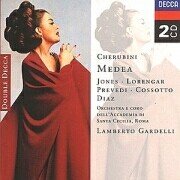| All Artists: Cherubini, Jones, Prevedi, Gardelli Title: Medea Members Wishing: 0 Total Copies: 0 Label: Polygram Records Release Date: 8/12/1997 Genre: Classical Styles: Opera & Classical Vocal, Historical Periods, Classical (c.1770-1830) Number of Discs: 2 SwapaCD Credits: 2 UPC: 028945261126 |
Search - Cherubini, Jones, Prevedi :: Medea
 | Cherubini, Jones, Prevedi Medea Genre: Classical
|
Larger Image |
CD Details |
CD ReviewsAn alternative to Callas 03/21/1999 (4 out of 5 stars) "Not that I don't love Callas, but this recording is something you should consider, especially at this bargain price. You might be concerned about Dame Gwynneth's squally tendencies, but listen ing to this might make you reevaluate her. She strikes quite a pose on the cover, red hair piled up stylishly, looking completely inappropriate but utterly fabulous in a blood red costume with matching lips and nails. This leads one to believe that her characterization may not be as serious as Callas', but she makes a convincing Medea, tres formidable. Her singing is much better than in other recordings, without the distressing moments where her voice sounds like it's about to unravel. Characterful and still beautiful and amazingly well controlled for a woman who could call home without using a telephone. Jones' voice sounds huge, and her Medea makes such an impact in sonic terms alone that one wonders how Giasone could have dared to leave her. This recording also has the advantage of a superior supporting cast, especially Lorengar whose voice is very formidable itself, almost too much so for this doormat of a character. Still, her aria is fantastic, and she attacks the high notes with thrilling fearlessness. One clear advantage is the superior playing of the orchestra, vastly superior to the Callas studio recording (in which the orchestra is dreadful)." Impressive opernnarr | Carrboro, NC USA | 05/08/2000 (3 out of 5 stars) "Yes, I know, Callas... But if you want to hear another voice in this music, Gardelli's 1967 recording is worthy of attention. Don't let the presence of Gwyneth Jones scare you away. At this early stage of her career, she possessed an immense, technically secure, powerful voice, and she unleashes everything for the big moments. Perhaps she's a little driven at times, but it fits the role perfectly. Her final scene is especially impressive. Of course, she doesn't etch out the character like Callas, nor is she as sympathetic as Rysanek. Her Italian is decidedly imperfect, too, but the big, thrilling sound compensates. Lorengar is a wonderful Glauce, singing her aria with a beautiful tone and fleet coloratura, but the rest of the cast is subpar. Cossotto, in particular, sounds bored, and Prevedi has nothing to say about this music. Recommended to anyone interested and especially to those who wonder where all the fuss about Jones comes from." A Welcome Re-issue Vincent Lau | 01/28/2000 (4 out of 5 stars) "When this recording was made in the late 60s, the wobble which afflicted Dame Gwyneth's voice in some of her later performances was almost non-existent. Indeed, the voice of Medea in this recording sounds fresh and fully under control with a gleaming top register which is quite thrilling (the lowest register was then, by contrast, not as strong as it later would become). While Dame Gwyneth's protrayal of Medea may not be as deeply etched as Callas's (Medea was, after all, one of Callas's most famous roles), there're lots of fire in her singing and she does pay considerable attention to the text. The supporting cast is mostly fine and I'm very pleased to hear Pilar Lorengar in the role of Glauce, her tone secure and very beautiful. Fiorenza Cossotto is a strong-voiced Neris and Justino Diaz a solid Creon. Bruno Prevedi's Jason is, however, just adequate. The playing of the orchestra under Gardelli also deserves praise. Given the paucity of recordings of the opera, this re-issue is most welcome."
|

 Track Listings (12) - Disc #1
Track Listings (12) - Disc #1